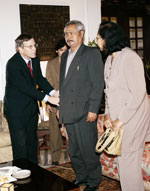
Intl students, families assured US committed to their safety
Washington – The slayings at Virginia Polytechnic Institute and State University (Virginia Tech) were an international tragedy, a senior State Department official said, but she assured scholars interested in studying at American institutions that U.S. authorities are doing everything they can to provide safe learning environments. In April 19 testimony before the House Appropriations Subcommittee on State and Foreign Operations, Under Secretary of State for Public Diplomacy Karen Hughes said the shootings had been "horrific" and the identity of the victims "underscored … the international nature" of higher education in the United States. "As the names and the nationalities of the victims and their families come forward, we're learning that many came from countries across the world," she said. Hughes also sought to assure international students and their families that "we want our schools to be safe places of sanctuary and learning, and … we are committed to doing all we can to ensure the safety of our campuses and the security of our students and faculty." The attacks in Blacksburg, Virginia, are seen as unique because homicides on U.S. campuses otherwise have been very rare. According to the U.S. Department of Education, the yearly average has been under 10 in recent years. However, in the aftermath of the tragedy, many schools have announced they are seeking ways to send emergency messages to the cellular phones and digital devices that are in constant use by many students and faculty in order to quickly send out alert messages. International tragedy Librescu "gave his own life so that others might live," Bush said. "With the gunman set to enter his class, this brave professor blocked the door with his body while his students fled to safety." Librescu's heroism also was honored by the Romanian government with that country's highest national decoration. Another faculty victim was professor GV Loganathan, an award-winning lecturer in civil and environmental engineering who had moved to the United States from the southern Indian state of Tamil Nadu. Loganathan, who had taught at Virginia Tech since 1982, was an adviser to about 75 undergraduate students. International outreach She said a record 591,000 student and exchange visas had been issued in 2007. And, in partnership with U.S. institutions of higher learning, Hughes said the Bush administration wants to send a "clear message" to international students and scholars. "We want the future leaders of the world to come here, to study, and get to know us," she said. She also said the United States wants to promote cultural and artistic exchange. By doing so, "we're fostering the freedom of expression that is the lifeblood of the arts and reminding audiences across the world that despite differences of language or culture or policy, we share a common humanity." |
| || Front
Page | News
| Editorial
| Columns
| Sports
| Plus
| Financial
Times | International
| Mirror
| TV
Times | Funday
Times || |
| |
Copyright
2007 Wijeya
Newspapers Ltd.Colombo. Sri Lanka. |


